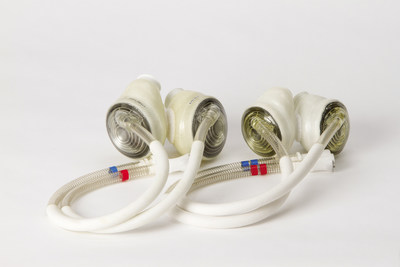SynCardia Release: Early Findings Of The 50cc SynCardia Heart Indicate That It Fits Underserved Patients - Women & Adolescents
TUCSON, Ariz., Feb. 29, 2016 /PRNewswire/ -- SynCardia Systems, Inc. announced that between December 2014 through Wednesday, February 24, 2016, 23 patients (70% female, compared to the historical average of only 12% for the larger 70cc TAH-t) have been implanted with the new 50cc SynCardia temporary Total Artificial Heart (TAH-t).

Pediatric patients, ages 21 and under, represent 13% of 50cc TAH-t implants. This is 300% more than the 70cc average of 4% pediatric patients. Though the 50cc numbers are small they demonstrate significant trends.
Body surface area (BSA) is a general indicator to help determine whether a SynCardia Total Artificial Heart will fit a patient. To help ensure fit, a T10 measurement from the spine to chest is taken. Virtual implantation using 3D imaging is used in specific cases.
Watch CBS News on the SynCardia Total Artificial Heart and view data charts
Data for 505 SynCardia 70cc TAH-t implants show the wide spectrum of BSAs that accommodate the larger heart. Statistics come from a combination of SynCardia and INTERMACS databases. BSA data is available for 22 of the 23 50cc SynCardia Heart patients.
"The 50cc SynCardia Total Artificial Heart is designed to accommodate underserved populations, including women and adolescents," says Michael P. Garippa, President and CEO of SynCardia Systems, Inc. "The 50cc, together with the 70cc TAH-t, are intended to make SynCardia's Total Artificial Heart technology available to almost all adults, as well as many more adolescents, because of its smaller size."
The new 50cc SynCardia TAH-t is approved for use in Europe through the CE Mark and separately by Health Canada. The 50cc is available in the United States through an FDA-approved Investigational Device Exemption (IDE) clinical study, and for compassionate or emergency use at SynCardia Certified Centers. CAUTION In the United States, the 50cc SynCardia temporary Total Artificial Heart is an investigational device, limited by United States law to investigational use.
The 70cc Heart is the first and only U.S. (FDA), Europe (CE Mark) and Health Canada-approved Total Artificial Heart in the world. Like a heart transplant, the SynCardia TAH-t is the only approved device that eliminates end-stage biventricular (both sides) heart failure.
Destination Therapy Clinical Study
Since October 2004, the 70cc SynCardia temporary Total Artificial Heart has been FDA approved for use as a bridge to a donor heart transplant. The FDA has approved SynCardia Investigational Device Exemption (IDE) clinical study for 19 patients who do not qualify for a donor heart.
"This study is generating data on the effective use of the SynCardia Heart in these patients as a way for them to recover from heart failure and continue with a near-normal lifestyle," Garippa said. CAUTION: The 70cc SynCardia Total Artificial Heart, when used for destination therapy, is an investigational device, limited by United States law to investigational use.
Donor Hearts: Demand Exceeds Supply
Speaking on Tuesday's (February 23, 2016) CBS This Morning news show, Dr. Francisco Arabia said, "The problem is a lack of donor hearts. As many as 100,000 people in the U.S. need new hearts, but only about 4,000 made the wait list and a little more than 2,500 received a transplant last year."
"It's a matter of having a higher demand than supply," Arabia said. "We use the Total Artificial Heart to give patients the time to be able to wait for the correct donor."
The SynCardia Total Artificial Heart is by far the most used artificial heart in the world. From 1969 through February 24, 2016 there have been 1,623 artificial implants representing 13 different designs. Of those implants, 1,576 used the SynCardia TAH-t or its direct predecessors. This represents 96% of all artificial heart implants and accounts for 98% (520 Years) of patient support.
For additional information, please visit: http://www.syncardia.com/
Like SynCardia on Facebook
Follow SynCardia on Twitter @SynCardia
Connect with SynCardia on LinkedIn
Share and Discover on Google+
About the SynCardia temporary Total Artificial Heart
SynCardia Systems, Inc. in Tucson, Arizona is a medical technology company focused on developing and manufacturing the SynCardia temporary Total Artificial Heart (TAH-t). The SynCardia TAH-t is an implantable system designed to assume the full function of a failed human heart in patients suffering from end-stage biventricular (both sides) heart failure.
The SynCardia TAH-t is the only Total Artificial Heart that is commercially available in the United States, European Union and Canada for use as a bridge to donor heart transplantation.
More than 1,560 implants of the SynCardia Total Artificial Heart account for 520 patient years of life on the device. Since January 2012 more than 550 SynCardia Hearts have been implanted.
The youngest patient to receive a SynCardia Heart was 9 years old; the oldest was 80 years old. The longest a patient has lived with a SynCardia Heart and received a successful donor heart transplant was nearly four years (1,374 days).
SynCardia Systems also manufactures the Freedom® portable driver, which powers the SynCardia Heart while allowing clinically stable patients to be discharged from the hospital and live at home and in their communities. The Freedom® portable driver has been used by more than 265 patients, accounting for over 175 patient years of support.
Photo - http://photos.prnewswire.com/prnh/20160228/338289
To view the original version on PR Newswire, visit:http://www.prnewswire.com/news-releases/early-findings-of-the-50cc-syncardia-heart-indicate-that-it-fits-underserved-patients---women--adolescents-300227527.html
SOURCE SynCardia Systems, Inc.

